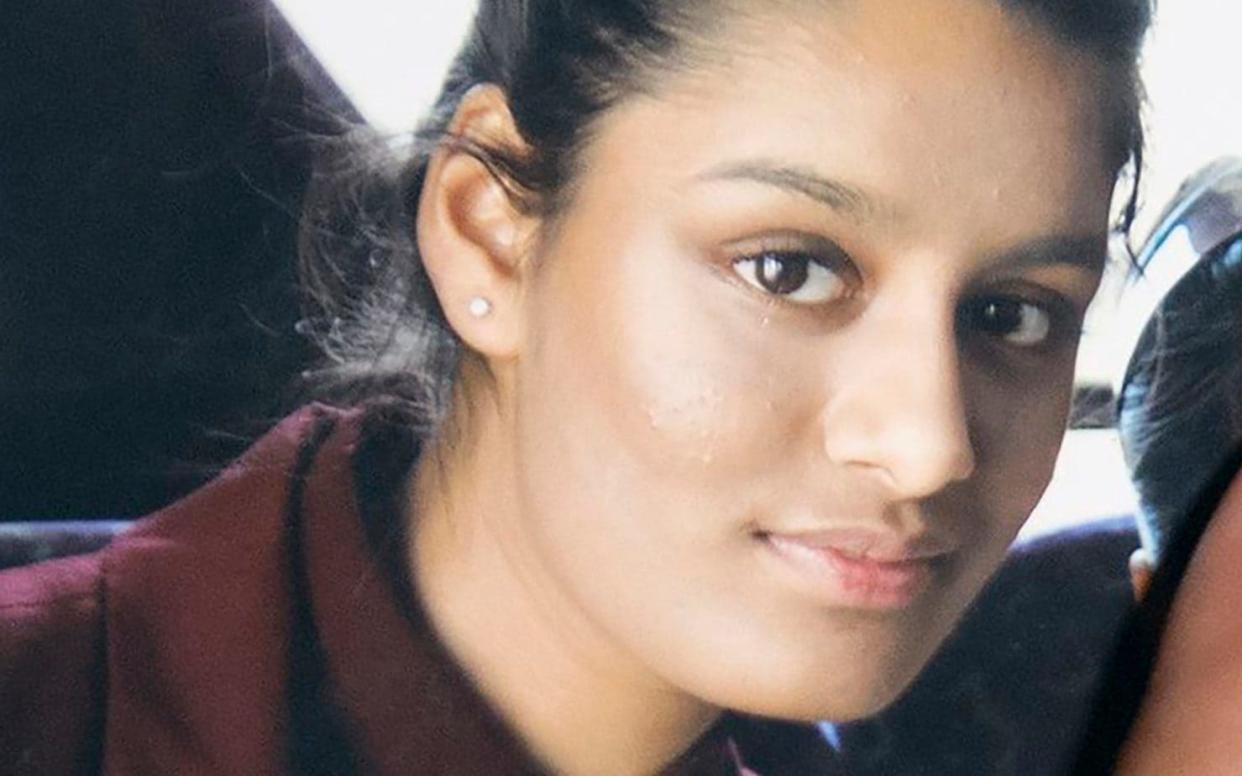Shamima Begum: What could happen to the Isil bride?

The Home Office has stripped jihadi bride Shamima Begum of her British citizenship, but the ongoing saga of what will happen next to her and her days-old son remains up in the air.
International law forbids nations from making people stateless by revoking their only citizenship, prompting speculation that Begum held dual citizenship through her Bangladeshi parents.
On Wednesday morning, Begum's lawyer Tasnime Akunjee said his client does not have dual nationality, but the Home Office told The Telegraph laws in Bangladesh means the teenager automatically retains dual citizenship until she is 21.
Her family say they will consider "all legal avenues to challenge this decision", and Begum herself said that she may think about trying to travel with her terrorist husband to his home country of Holland to claim citizenship there.
The case has prompted fresh discussions over how Britain manages those returning or attempting to come back from Syria, once gripped by the tyranny of Islamic State (Isil).
She married an Isil fighter and on Sunday have birth to her third child at a refugee camp in northeastern Syria. Her first two children died. Begum's family has pleaded for the 19-year-old to be shown mercy and to be allowed to return to east London.
But what options do authorities have in such instances?
Remain in Syria
If Begum is not repatriated, the Kurdish-led Syrian Democratic Forces (SDF) could hand her over to neighbouring Iraqi forces, Middle East Correspondent Josie Ensor explains.
The Telegraph is aware of at least three cases, including European citizens, where male Isil suspects have been transferred from Syria to Iraq to face trial.
This would be a controversial option as Baghdad has the option to impose the death penalty, which the UK opposes.
Foreign detainees are currently being held by the SDF in an area of Kurdish self-rule in northeastern Syria. The SDF has said that they do not have the money or resources to hold them forever.

They have warned that if Turkey invades, which it has threatened, it could see the prisoners being set free in the chaos.
The Syrian Kurds are also in talks with the Syrian government about ceding some of their territory, which could see some foreign prisoners being handed over to the regime.
A third option - Mustafa Bali, the SDF spokesman, has called for an international court to be set up in Syria. This would see them tried by international judges in Syria but return home to serve their sentence.
However, sources at the UN say it would be difficult if not impossible to set up such a court in Kurdish-held territory without the authority of the Syrian government.
Bangladesh dual citizenship
The Telegraph understands that the Home Office made the decision to revoke Begum's British citizenship based on Bangladeshi law.
There, until the age of 21, it is understood the Isil bride automatically retains dual nationality due to the fact her parents are both from the country.
At the age of 21, a child born to Bangladeshi parents has the right to waive their right to dual nationality, but not before.
The complication lies in how she gets to Bangladesh - where it is understood her father is currently living - and how she proves that she is Shamima Begum.
The teenager has never visited the country and does not have a Bangladeshi passport. Her old British passport is invalid due to her citizenship being revoked and she has previously said she used her sister's passport to travel to Syria back in 2015.
One possible option for her would be to travel to Turkey via the notoriously penetrable border with Syria and present herself to the Bangladeshi embassy.
But officials in Dhaka may well appeal the Home Office's decision to make Begum their responsibility, insisting that she has never even been to the country.
Attempt to gain Dutch citizenship
Begum married Isil fighter Yago Riedjik in Syria having travelled to the Middle East from Bethnal Green in east London in 2015.
His whereabouts are still unknown, but when asked what she might do next, the Isil bride told ITV News: "Another option I might try with my family is my husband is from Holland and he has family in Holland.
"Maybe I can ask for citizenship in Holland. If he gets sent back to prison in Holland I can just wait for him while he is in prison."
This would need a number of elements to align for it to even be a possibility.
First, Holland would have to accept to take Riedjik back, having left the country to become a terrorist in the Middle East.

The country doesn't offer to help its citizens in Syria who are willing to return, and if they report to an embassy, they would be transported to Holland, arrested and prosecuted.
A foreigh fighter with dual nationalities deemed a threat to national security - like Britain - can have their Dutch citizenship and passport revoked.
If that happens, Begum would have to follow him. But her British passport is - as it stands - invalid. And she previously said she had travelled to Syria on her sister's passport, which has since been taken from her.
Dutch legislation dictates that a spouse or partner wishing to live in Holland would need a residence permit, and in order to be eligible for a permit - they must have a valid passport or other travel documents.
Somehow, if she manages to make the 2,000-mile journey from Syria to Holland, the Dutch authorities would have to accept that she and Riedjik are married.
The pair were wed within the confines of Islamic State a matter of weeks after she arrived. It is highly unlikely there is paperwork to prove they are legally married, and even if there is, the Dutch authorities would have to accept it as binding.
Home Office decision is rescinded
As the Home Office's letter states, Shamima Begum and her family have the right to appeal the decision.
Her lawyer Tasnima Akunjee's rhetoric all along suggests he will help his client fight any move to strip her of her British citizenship.

If judges side with Begum, deciding Sajid Javid had no right to revoke her British citizenship because it renders her stateless - the Government would be back to square one.
The appeal might not necessarily need to happen. If, as Begum's lawyer suggests, the Isil bride is currently stateless - the Home Office would be forced to reverse it stance.
In that scenario, all these options are once again back on the table.
Sent to Guantánamo Bay
As revealed by Ben Riley-Smith, Robert Mendick and Laura Fitzpatrick on The Telegraph's front page on Friday, the United States is planning to send British Isil fighters to Guantánamo Bay amid frustration at the UK's failure to take responsibility for its homegrown terrorists.
Senior US officials believe Guantánamo can house more than 50 Islamic State of Iraq and the Levant fighters, including the two surviving British members of the so-called "Beatles" terrorist cell that executed Western hostages.
It has emerged that the vast majority of Islamist fighters returning to the UK from Syria have been placed on "secretive" government rehabilitation schemes rather than prosecuted.
Despite British concern, Guantánamo Bay is being readied in the run-up to Donald Trump's withdrawal of US troops from Syria as soon as April.
There is acute frustration within the Trump administration over how Britain and other western European countries are refusing to take back their foreign fighters for prosecution in their own courts.

Arrest and prosecution
Home Secretary Sajid Javid previously said those who make it back "should be ready to be questioned, investigated and potentially prosecuted".
But authorities have faced difficulties obtaining evidence to prove someone committed crimes in Syria.
Most recently, The Isil Beatles have caused the Government enormous problems. Two of the four suspected terrorists' fate has been left in limbo as the UK and the US play tug-of-war with where they will end up in court.
The Home Office previously blocked their return, and they could end up in an American federal court facing the death penalty after the CPS said there was "insufficient evidence" for them to be tried in the UK.

Figures disclosed in the Commons last year suggested that only around one in 10 returnees has been prosecuted over "direct action" in Syria, although ministers say a significant proportion of those who have come back were assessed as no longer being of national security concern.
New legislation which passed last week made it an offence to enter or remain in overseas terror hotspots, officially termed "designated areas".
Managed return to UK
Powers known as temporary exclusion orders (TEOs) were introduced in 2015.
They can last for up to two years and can be imposed on those suspected of involvement in terrorism abroad, making it unlawful for them to return to the UK without engaging with authorities.
The powers were unused in 2016, while nine TEOs were issued in 2017.
TPIMs
Terrorism Prevention and Investigation Measures (TPIMs) allow the Home Secretary to impose a range of disruptive measures on individuals who are suspected of posing a threat to security but who cannot be prosecuted, or, in the case of foreign nationals, deported.
Restrictions can include relocation to another part of the country, electronic monitoring and limits on the use of phones and computers.
As of the end of August, six TPIMs were in force.
Deradicalisation back in Britain
Returnees could be referred to the Government's £40 million a year Prevent programme, which aims to stop people being drawn into terrorism.
There were 7,318 individuals referred to Prevent in 2017/18.

In most cases, referrals are found to require no further action or passed to other services, but when authorities conclude there is a danger the person could be drawn into terrorism, they can be supported through a voluntary scheme known as Channel.
Prevent is backed by ministers and police, but has been described as "toxic" by critics, and the Government announced earlier this year that it would be independently reviewed.

 Yahoo News
Yahoo News 
